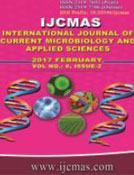


 National Academy of Agricultural Sciences (NAAS)
National Academy of Agricultural Sciences (NAAS)

|
PRINT ISSN : 2319-7692
Online ISSN : 2319-7706 Issues : 12 per year Publisher : Excellent Publishers Email : editorijcmas@gmail.com / submit@ijcmas.com Editor-in-chief: Dr.M.Prakash Index Copernicus ICV 2018: 95.39 NAAS RATING 2020: 5.38 |
In climate change scenario the availability of fresh water for human use has become one of the key concerns and due to increasing pollution load from various anthropogenic sources and runoff from agricultural land had put a tremendous pressure on the available water resources in terms of its quality. Yamuna River is extremely polluted in the Delhi region and has been extensively studied for selected parameters. The water sample of Yamuna River was collected from 10 different locations of Delhi region starting from Wazirabad (Ram Ghat) to Okhla barrage in the month of June 2015 and December 2015. The samples collected were then analyzed for different physicochemical parameters including pH, TDS (total dissolved solids), EC (electrical conductivity), DO (dissolved oxygen), BOD (biochemical oxygen demand) and nutrient concentrations such as nitrate, nitrite, ammonia, phosphate and silica to determine the seasonal variation. The concentration of dissolved nutrients (nitrate, nitrite, ammonia and phosphate) in the River water of Delhi was found relatively higher in comparison to the concentration which was found in an unpolluted river (Meybeck 1979, 1982) and this indicated that nutrient chemistry of river is highly influenced by the anthropogenic activities taking place in the river catchment area. Water quality indices (WQI) were introduced and calculated to reduce great amount of parameters into a simpler expression which enables easy interpretation of monitoring data.WQI was determined for three segments of Delhi (Upper, middle and down segment) and has found very high (>100). In this study, Final representation of water quality index (WQI) has been done on the GIS map to show spatial variation of pollution level in the entire Delhi stretch.
 |
 |
 |
 |
 |